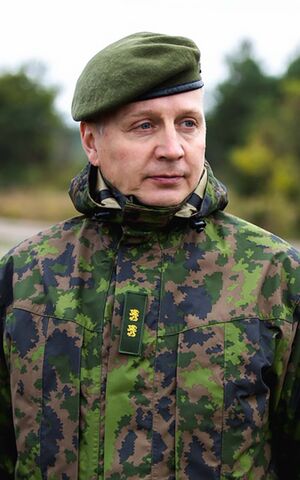Áron Surány
This article is incomplete because it is pending further input from participants, or it is a work-in-progress by one author. Please comment on this article's talk page to share your input, comments and questions. Note: To contribute to this article, you may need to seek help from the author(s) of this page. |
Áron Surány | |
|---|---|
 Surány in 2011. | |
| Born | 26 September 1959 Püspökladány, Ruvelka |
| Allegiance | |
| Service/ | |
| Years of service | 1968–2012 |
| Rank | Chief Regimental Commander |
| Battles/wars | Imerti Conflict Zemplen War |
| Awards | see below |
Áron Bertalan Surány (born 26 September 1959) is a retired Ruvelkan Imperial Army chief regimental commander (equivalent to the rank of four-star general) who served as the Chief of the Imperial General Staff during the Zemplen War. After the conclusion of the conflict in 2010, Surány served for two more years before eventually retiring.
Áron was born in Püspökladány in 1959 and was educated in the Püspökladány public school system. Upon reaching the age of 18, Áron went on to join the Imperial Army as part of his mandatory military service requirement; in 1971 he attended Ruvelka State University and earned a bachelor’s degree in anthropology. As a professional soldier for nearly 44 years, Surány held a number of commands and staff positions.
Serving in the role of Chief of the Imperial General Staff at the onset of the Zemplen War, Surány was forced to mobilize the Principality’s military in its defense. Surány quickly understood the strategic and tactical advantages possessed by Syaran Commonality Armed Forces in the early months and quickly prioritized preserving Ruvelkan personnel, arms, and materiel at the cost of losing ground. He suffered significant criticism, both from politicians and the people, for his decision to draw Ruvelka’s battle line further east.
In the aftermath of the Zemplen War, Surány’s tenure as Chief of the Imperial General Staff is viewed favorably. Although making controversial decisions early in the conflict, Áron was capable of formulating a long-term logistical strategy that ultimately led to Ruvelka’s victory.